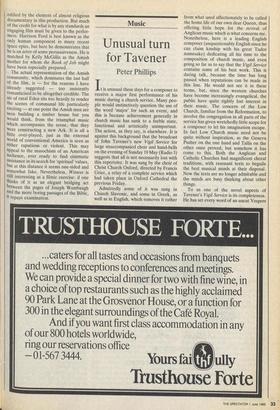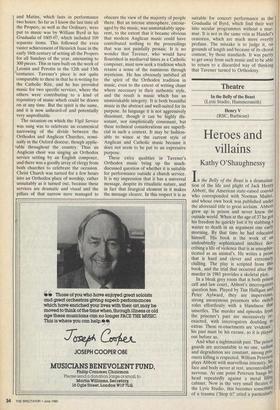Mu sic
Unusual turn for Tavener
Peter Phillips
It is unusual these days for a composer to receive a major first performance of his music during a church service. Many peo- ple would instinctively question the use of the word 'major' for such an event, and this is because achievement generally in church music has sunk to a feeble state, functional and artistically unimportant. The action, as they say, is elsewhere. It is against this background that the broadcast of John Tavener's new Vigil Service for large unaccompanied choir and hand-bells on the evening of Sunday 19 May (Radio 3) suggests that all is not necessarily lost with this repertoire. It was sung by the choir of Christ Church Oxford, directed by Francis Grier, a relay of a complete service which had taken place in Oxford Cathedral the previous Friday.
Admittedly some of it was sung in Church Slavonic, and some in Greek, as well as in English, which removes it rather
from what used affectionately to be called the home life of our own dear Queen, thus offering little hope for the revival of Anglican music which is what concerns me. Nonetheless, here is a leading English composer (unquestionably English since he can claim kinship with his great Tudor namesake) dedicating all his time to the composition of church music, and even going so far as to say that the Vigil Service contains some of his best work. This is daring talk, because the time has long passed when reputations can be made in this line. He would not see it in these terms, but, since the western churches have become increasingly evangelical, the public have quite rightly lost interest in their music. The concern of the Low Church, familiar from the Reformation, to involve the congregation in all parts of the service has given wretchedly little scope for a composer to let his imagination escape. In fact Low Church music need not be quite without inspiration, as the Geneva Psalter on the one hand and Tallis on the other once proved, but somehow it has come to this. Both the Anglican and Catholic Churches had magnificent choral traditions, with resonant texts to beguile the best musical minds at their disposal. Now the texts are no longer admirable and the minds are busy thinking about other things.
To us one of the novel aspects of Tavener's Vigil Service is its completeness. He has set every word of an uncut Vespers and Matins, which lasts in performance two hours. So far as I know the last time all the Propers, as well as the Ordinary, were put to music was by William Byrd in his Gradualia of 1605-07, which included 109 separate items. This followed the even vaster achievement of Heinrich Isaac in the early 16th century of setting all the Propers for all Sundays of the year, amounting to 300 pieces. This in turn built on the work of Leonin and Perotin in the 12th and 13th 'centuries. Tavener's piece is not quite comparable to these in that he is writing for the Catholic Rite, and he has provided music for two specific services, where the others were contributing to a kind of repository of music which could be drawn on at any time. But the spirit is the same, and it is now unheard-of and potentially very unprofitable.
The occasion on which the Vigil Service was sung was to celebrate an ecumenical narrowing of the divide between the Orthodox and Anglican Churches, nomi- nally in the Oxford diocese, though applic- 'able throughout the country. Thus an Anglican choir was singing an Orthodox service setting by an English composer, and there was a goodly array of clergy from both churches to celebrate the occasion. Christ Church was turned for a few hours into an Orthodox place of worship, rather unsuitably as it turned out, because these services are dramatic and visual and the pillars of that narrow nave managed to
obscure the view of the majority of people there. But an intense atmosphere, encour- aged by the music, was unmistakably appa- rent, to the extent that it became obvious that modern Anglican music could have contributed nothing to the proceedings that was not painfully prosaic. It is no wonder that Tavener, who would have flourished in mediaeval times as a Catholic composer, must now seek a tradition which retains a sense of the numinous through mysticism. He has obviously imbibed all the spirit of the Orthodox tradition in music, even to the extent of writing chant where necessary in their authentic style, and the result is music which has an unmistakable integrity. It is both beautiful music in the abstract and well-suited for its purpose. In language it is not aggressively dissonant, though it can be highly dis- sonant, nor simplistically consonant, but these technical considerations are superfi- cial in such a context. It may be fashion- able to wince at the current style of Anglican and Catholic music because it does not seem to be put to an expressive purpose.
These extra qualities in Tavener's Orthodox music bring up the much- discussed question of whether it is suitable for performance outside a church service. It is my impression that it has a universal message, despite its ritualistic nature, and in fact that liturgical element in it makes the message clearer. In this respect it is as
suitable for concert performance as the Gradualia of Byrd, which find their way into secular programmes without a mur- mur. It is not in the same vein as Handel's oratorios, which are much more overtly profane. The mistake is to judge it, on grounds of length and because of its choral content, by those standards. It was partly to get away from such music and to be able to return to a discarded way of thinking that Tavener turned to Orthodoxy.



















































 Previous page
Previous page